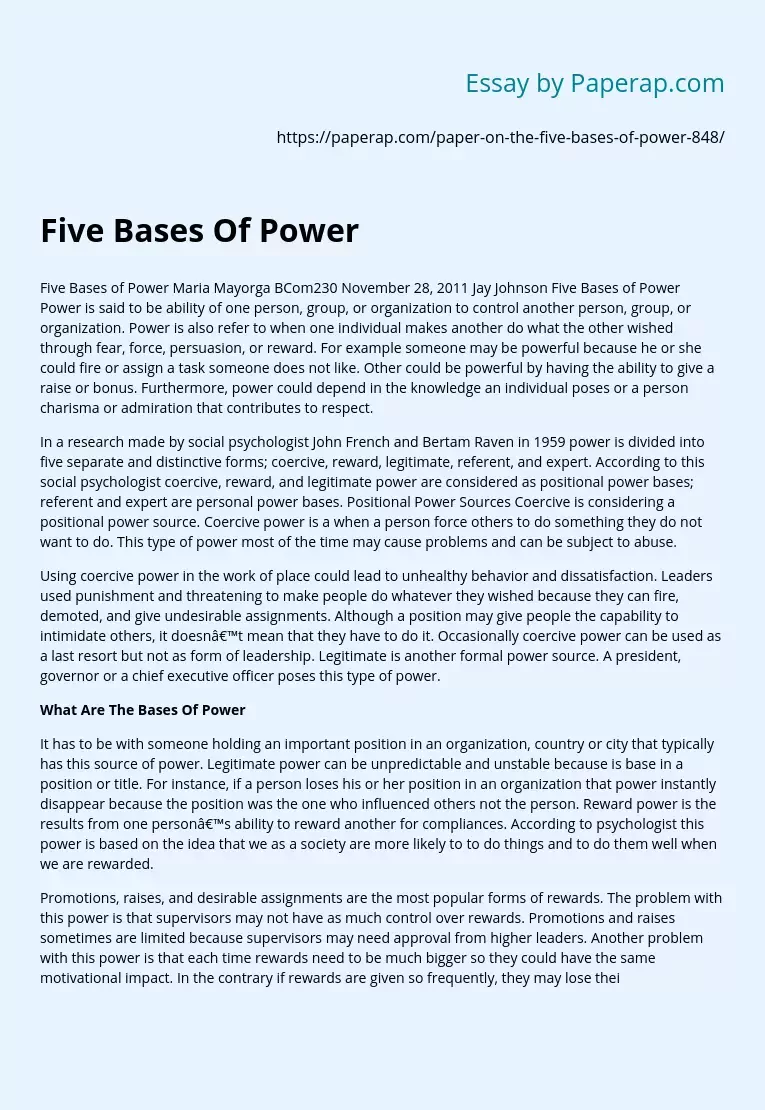Five Bases Of Power
Five Bases of Power Maria Mayorga BCom230 November 28, 2011 Jay Johnson Five Bases of Power Power is said to be ability of one person, group, or organization to control another person, group, or organization. Power is also refer to when one individual makes another do what the other wished through fear, force, persuasion, or reward. For example someone may be powerful because he or she could fire or assign a task someone does not like. Other could be powerful by having the ability to give a raise or bonus.
Furthermore, power could depend in the knowledge an individual poses or a person charisma or admiration that contributes to respect.
In a research made by social psychologist John French and Bertam Raven in 1959 power is divided into five separate and distinctive forms; coercive, reward, legitimate, referent, and expert. According to this social psychologist coercive, reward, and legitimate power are considered as positional power bases; referent and expert are personal power bases. Positional Power Sources Coercive is considering a positional power source.
Coercive power is a when a person force others to do something they do not want to do. This type of power most of the time may cause problems and can be subject to abuse.
Using coercive power in the work of place could lead to unhealthy behavior and dissatisfaction. Leaders used punishment and threatening to make people do whatever they wished because they can fire, demoted, and give undesirable assignments. Although a position may give people the capability to intimidate others, it doesn’t mean that they have to do it.
Occasionally coercive power can be used as a last resort but not as form of leadership. Legitimate is another formal power source. A president, governor or a chief executive officer poses this type of power.
What Are The Bases Of Power
It has to be with someone holding an important position in an organization, country or city that typically has this source of power. Legitimate power can be unpredictable and unstable because is base in a position or title. For instance, if a person loses his or her position in an organization that power instantly disappear because the position was the one who influenced others not the person. Reward power is the results from one person’s ability to reward another for compliances. According to psychologist this power is based on the idea that we as a society are more likely to to do things and to do them well when we are rewarded.
Promotions, raises, and desirable assignments are the most popular forms of rewards. The problem with this power is that supervisors may not have as much control over rewards. Promotions and raises sometimes are limited because supervisors may need approval from higher leaders. Another problem with this power is that each time rewards need to be much bigger so they could have the same motivational impact. In the contrary if rewards are given so frequently, they may lose their effectiveness. Personal Power Sources A person’s superior knowledge and skills gives an individual the ability to poses expert power.
Individuals with expert power are well prepared to face any difficulty or problem that may occur in organization because of their experience. People will listen to people with this type of power because they demonstrate expertise. The individuals with this type of power gained respect and trust because their ideas have more value. The expert power is one of the best methods of leadership and can be useful to become a successful leader. Referent power is also a personal power source is based in the result of a person’s attractiveness, and charisma. A person may be like because of the personality that individual poses.
Likewise an individual may like or respect that person because may identify with that person in some way. Celebrities have this type of power; fans may identify with their music, or their movies. Referent power can represent a big responsibility because the individual don’t necessarily have to do anything to earn it. It can be abused very easily because if someone who is likeable but lacks integrity may rise to power and may use that power to hurt other individuals. Relying on this type of power alone is not good for a leader who wants respect; however, combined with other source of power it can help achieve success.
Power can be hold by anyone and can be used to help or affect individuals. If a person wants to become successful leader it is important to learn and recognize the different types of powers. Powers can be a powerful tool if people learn to use those in the correct way. Learned to use those powers that they are more effective and could make someone become a more influential leader. References Mindtools. com- French and Raven’s Five Forms of Power Wikipedia. com- French and Raven’s Five Bases of Power
Five Bases Of Power. (2019, Dec 05). Retrieved from https://paperap.com/paper-on-the-five-bases-of-power-848/

